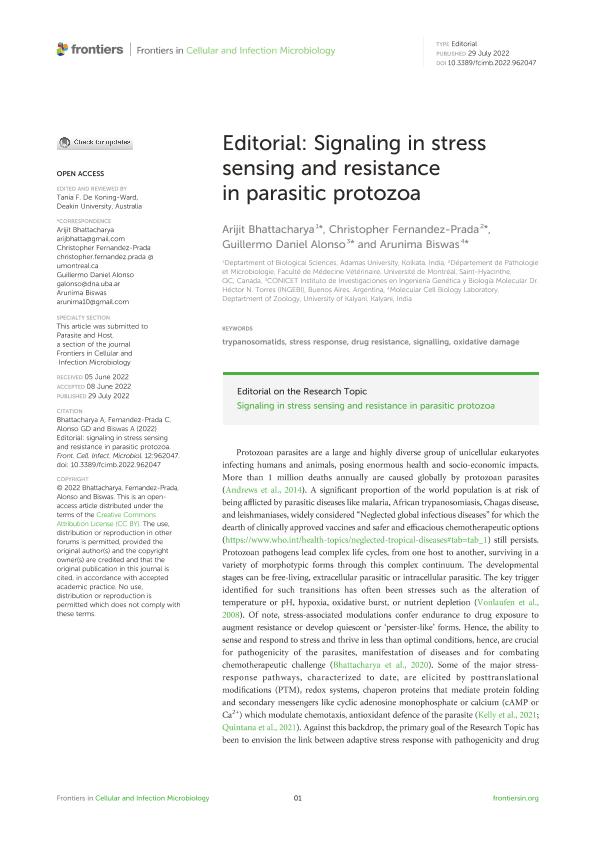Artículo
Editorial: Signaling in stress sensing and resistance in parasitic protozoa
Fecha de publicación:
07/2022
Editorial:
Frontiers Media
Revista:
Frontiers in Cellular and Infection Microbiology
e-ISSN:
2235-2988
Idioma:
Inglés
Tipo de recurso:
Artículo publicado
Clasificación temática:
Resumen
Protozoan parasites are a large and highly diverse group of unicellular eukaryotes infecting humans and animals, posing enormous health and socio-economic impacts. More than 1 million deaths annually are caused globally by protozoan parasites (Andrews et al., 2014). A significant proportion of the world population is at risk of being afflicted by parasitic diseases like malaria, African trypanosomiasis, Chagas disease, and leishmaniases, widely considered “Neglected global infectious diseases” for which the dearth of clinically approved vaccines and safer and efficacious chemotherapeutic options (https://www.who.int/health-topics/neglected-tropical-diseases#tab=tab_1) still persists. Protozoan pathogens lead complex life cycles, from one host to another, surviving in a variety of morphotypic forms through this complex continuum. The developmental stages can be free-living, extracellular parasitic or intracellular parasitic. The key trigger identified for such transitions has often been stresses such as the alteration of temperature or pH, hypoxia, oxidative burst, or nutrient depletion (Vonlaufen et al., 2008). Of note, stress-associated modulations confer endurance to drug exposure to augment resistance or develop quiescent or ‘persister-like’ forms. Hence, the ability to sense and respond to stress and thrive in less than optimal conditions, hence, are crucial for pathogenicity of the parasites, manifestation of diseases and for combating chemotherapeutic challenge (Bhattacharya et al., 2020). Some of the major stress-response pathways, characterized to date, are elicited by posttranslational modifications (PTM), redox systems, chaperon proteins that mediate protein folding and secondary messengers like cyclic adenosine monophosphate or calcium (cAMP or Ca2+) which modulate chemotaxis, antioxidant defence of the parasite (Kelly et al., 2021; Quintana et al., 2021). Against this backdrop, the primary goal of the Research Topic has been to envision the link between adaptive stress response with pathogenicity and drug response. With three original articles, the Research Topic offers a glance hinting towards the significance of PTM in oxidative stress response in T. cruzi, alteration of membrane dynamics in drug resistance in L. donovani, and development of a potential nanoformulation inducting hallmarks of stress response in L. donovani. Alongside this, an illustrative review highlights a putative trypanosmatid G-protein coupled receptor signaling in a sensing host environment.
Palabras clave:
DRUG RESISTANCE
,
OXIDATIVE DAMAGE
,
SIGNALLING
,
STRESS RESPONSE
,
TRYPANOSOMATIDS
Archivos asociados
Licencia
Identificadores
Colecciones
Articulos(INGEBI)
Articulos de INST.DE INVEST.EN ING.GENETICA Y BIOL.MOLECULAR "DR. HECTOR N TORRES"
Articulos de INST.DE INVEST.EN ING.GENETICA Y BIOL.MOLECULAR "DR. HECTOR N TORRES"
Citación
Bhattacharya, Arijit; Fernandez Prada, Christopher; Alonso, Guillermo Daniel; Biswas, Arunima; Editorial: Signaling in stress sensing and resistance in parasitic protozoa; Frontiers Media; Frontiers in Cellular and Infection Microbiology; 12; 7-2022; 1-4
Compartir
Altmétricas




